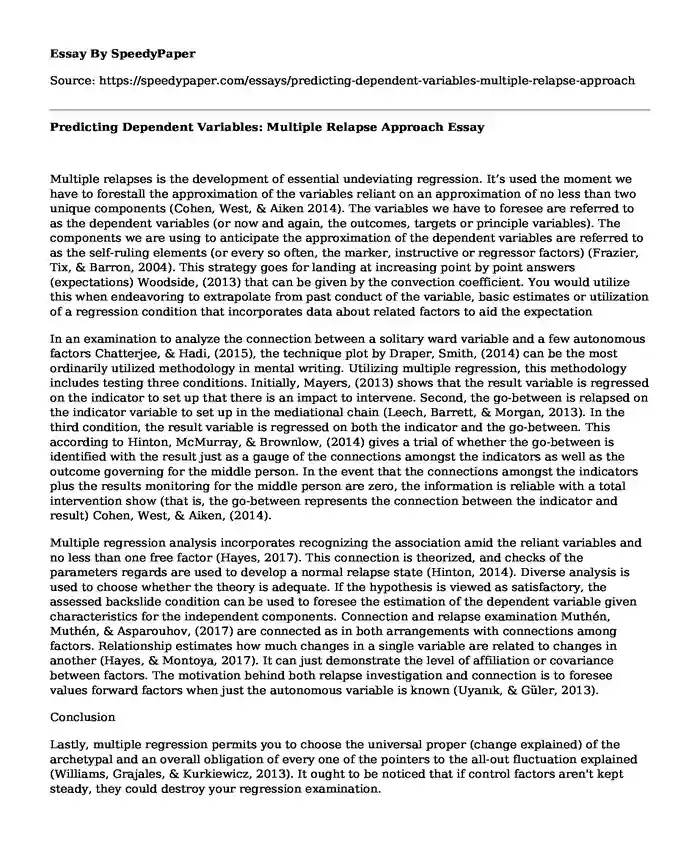Multiple relapses is the development of essential undeviating regression. It's used the moment we have to forestall the approximation of the variables reliant on an approximation of no less than two unique components (Cohen, West, & Aiken 2014). The variables we have to foresee are referred to as the dependent variables (or now and again, the outcomes, targets or principle variables). The components we are using to anticipate the approximation of the dependent variables are referred to as the self-ruling elements (or every so often, the marker, instructive or regressor factors) (Frazier, Tix, & Barron, 2004). This strategy goes for landing at increasing point by point answers (expectations) Woodside, (2013) that can be given by the convection coefficient. You would utilize this when endeavoring to extrapolate from past conduct of the variable, basic estimates or utilization of a regression condition that incorporates data about related factors to aid the expectation
In an examination to analyze the connection between a solitary ward variable and a few autonomous factors Chatterjee, & Hadi, (2015), the technique plot by Draper, Smith, (2014) can be the most ordinarily utilized methodology in mental writing. Utilizing multiple regression, this methodology includes testing three conditions. Initially, Mayers, (2013) shows that the result variable is regressed on the indicator to set up that there is an impact to intervene. Second, the go-between is relapsed on the indicator variable to set up in the mediational chain (Leech, Barrett, & Morgan, 2013). In the third condition, the result variable is regressed on both the indicator and the go-between. This according to Hinton, McMurray, & Brownlow, (2014) gives a trial of whether the go-between is identified with the result just as a gauge of the connections amongst the indicators as well as the outcome governing for the middle person. In the event that the connections amongst the indicators plus the results monitoring for the middle person are zero, the information is reliable with a total intervention show (that is, the go-between represents the connection between the indicator and result) Cohen, West, & Aiken, (2014).
Multiple regression analysis incorporates recognizing the association amid the reliant variables and no less than one free factor (Hayes, 2017). This connection is theorized, and checks of the parameters regards are used to develop a normal relapse state (Hinton, 2014). Diverse analysis is used to choose whether the theory is adequate. If the hypothesis is viewed as satisfactory, the assessed backslide condition can be used to foresee the estimation of the dependent variable given characteristics for the independent components. Connection and relapse examination Muthen, Muthen, & Asparouhov, (2017) are connected as in both arrangements with connections among factors. Relationship estimates how much changes in a single variable are related to changes in another (Hayes, & Montoya, 2017). It can just demonstrate the level of affiliation or covariance between factors. The motivation behind both relapse investigation and connection is to foresee values forward factors when just the autonomous variable is known (Uyanik, & Guler, 2013).
Conclusion
Lastly, multiple regression permits you to choose the universal proper (change explained) of the archetypal and an overall obligation of every one of the pointers to the all-out fluctuation explained (Williams, Grajales, & Kurkiewicz, 2013). It ought to be noticed that if control factors aren't kept steady, they could destroy your regression examination.
References
Cohen, P., West, S. G., & Aiken, L. S. (2014). Applied multiple regression/correlation analysis for the behavioral sciences. Psychology Press.
Cohen, P., West, S. G., & Aiken, L. S. (2014). Applied multiple regression/correlation analysis for the behavioral sciences. Psychology Press.
Draper, N. R., & Smith, H. (2014). Applied regression analysis(Vol. 326). John Wiley & Sons.
Frazier, P. A., Tix, A. P., & Barron, K. E. (2004). Testing moderator and mediator effects in counseling psychology research. Journal of counseling psychology, 51(1), 115.
Hayes, A. F. (2017). Introduction to mediation, moderation, and conditional process analysis: A regression-based approach. Guilford Publications.
Hayes, A. F., & Montoya, A. K. (2017). A tutorial on testing, visualizing, and probing an interaction involving a multicategorical variable in linear regression analysis. Communication Methods and Measures, 11(1), 1-30.
Hinton, P. R. (2014). Statistics explained. Routledge.
Hinton, P. R., McMurray, I., & Brownlow, C. (2014). SPSS explained. Routledge.
Leech, N., Barrett, K., & Morgan, G. A. (2013). SPSS for intermediate statistics: Use and interpretation. Routledge.
Mayers, A. (2013). Introduction to Statistics and SPSS in Psychology (Vol. 28). Harlow, England: Pearson.
Muthen, B. O., Muthen, L. K., & Asparouhov, T. (2017). Regression and mediation analysis using Mplus. Los Angeles, CA: Muthen & Muthen.
Suzuki, H., Tabata, T., Koizumi, H., Hohchi, N., Takeuchi, S., Kitamura, T., ... & Ohbuchi, T. (2014). Prediction of hearing outcomes by multiple regression analysis in patients with idiopathic sudden sensorineural hearing loss. Annals of Otology, Rhinology & Laryngology, 123(12), 821-825.
Uyanik, G. K., & Guler, N. (2013). A study on multiple linear regression analysis. Procedia-Social and Behavioral Sciences, 106, 234-240.
Williams, M. N., Grajales, C. A. G., & Kurkiewicz, D. (2013). Assumptions of multiple regression: Correcting two misconceptions.
Woodside, A. G. (2013). Moving beyond multiple regression analysis to algorithms: Calling for adoption of a paradigm shift from symmetric to asymmetric thinking in data analysis and crafting theory.
Cite this page
Predicting Dependent Variables: Multiple Relapse Approach. (2022, Dec 27). Retrieved from https://speedypaper.net/essays/predicting-dependent-variables-multiple-relapse-approach
Request Removal
If you are the original author of this essay and no longer wish to have it published on the SpeedyPaper website, please click below to request its removal:
- Application Ethics Essay Sample
- Essay Sample: Description of the Infectious Agent and Its Incubation Period
- Compare and Contrast Essay on the Concepts of Determinism, Compatibilism, and Libertarianism
- Jack the Ripper, Essay Example
- Comparative Essay Sample: Stylet Angulation of 60 and 90 for the Ease of Intubation with Videolaryngoscope
- Free Essay Comparing President Obama and Trump's Immigration Policy
- Paper Example on Preparing Couples for Marriage
Popular categories





